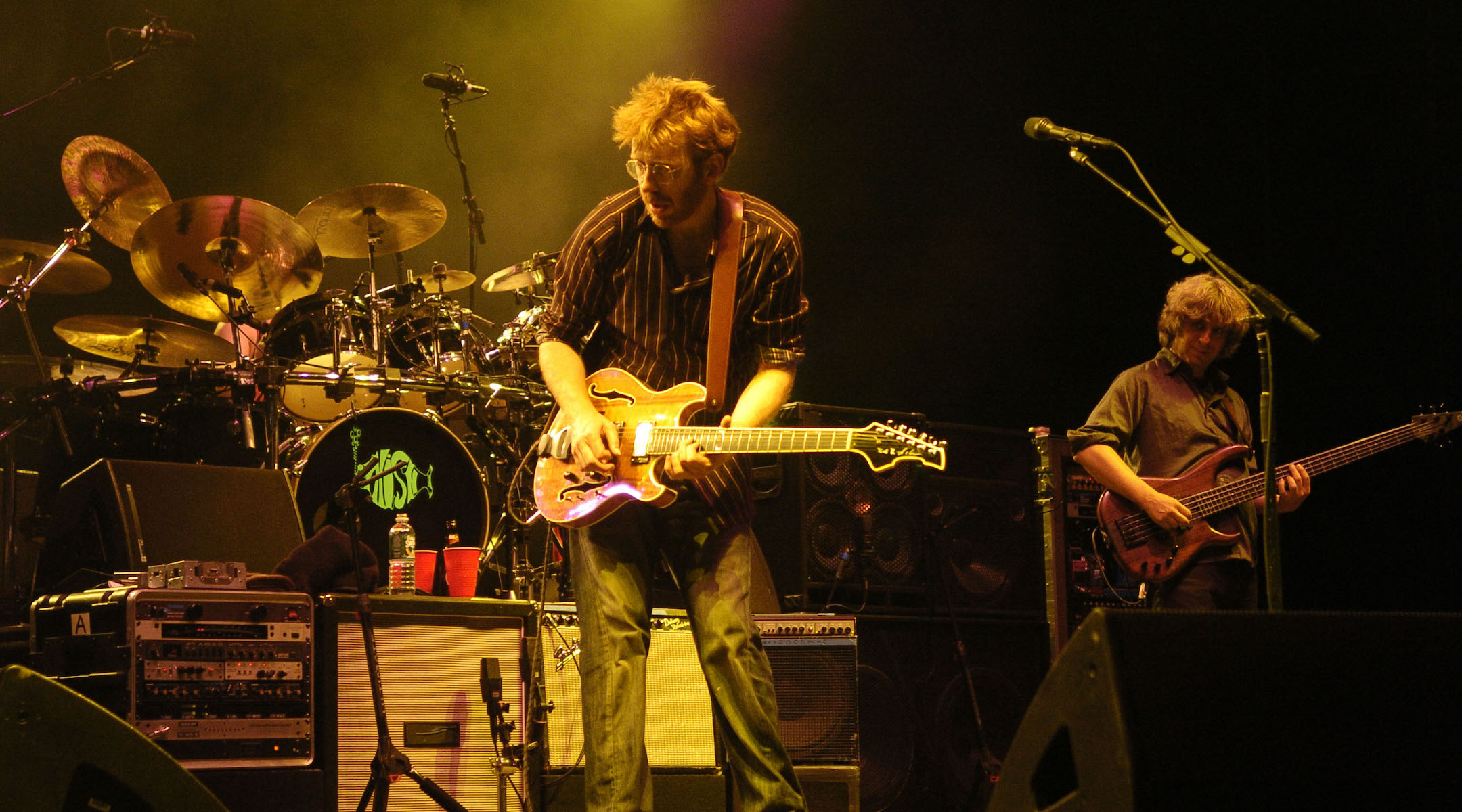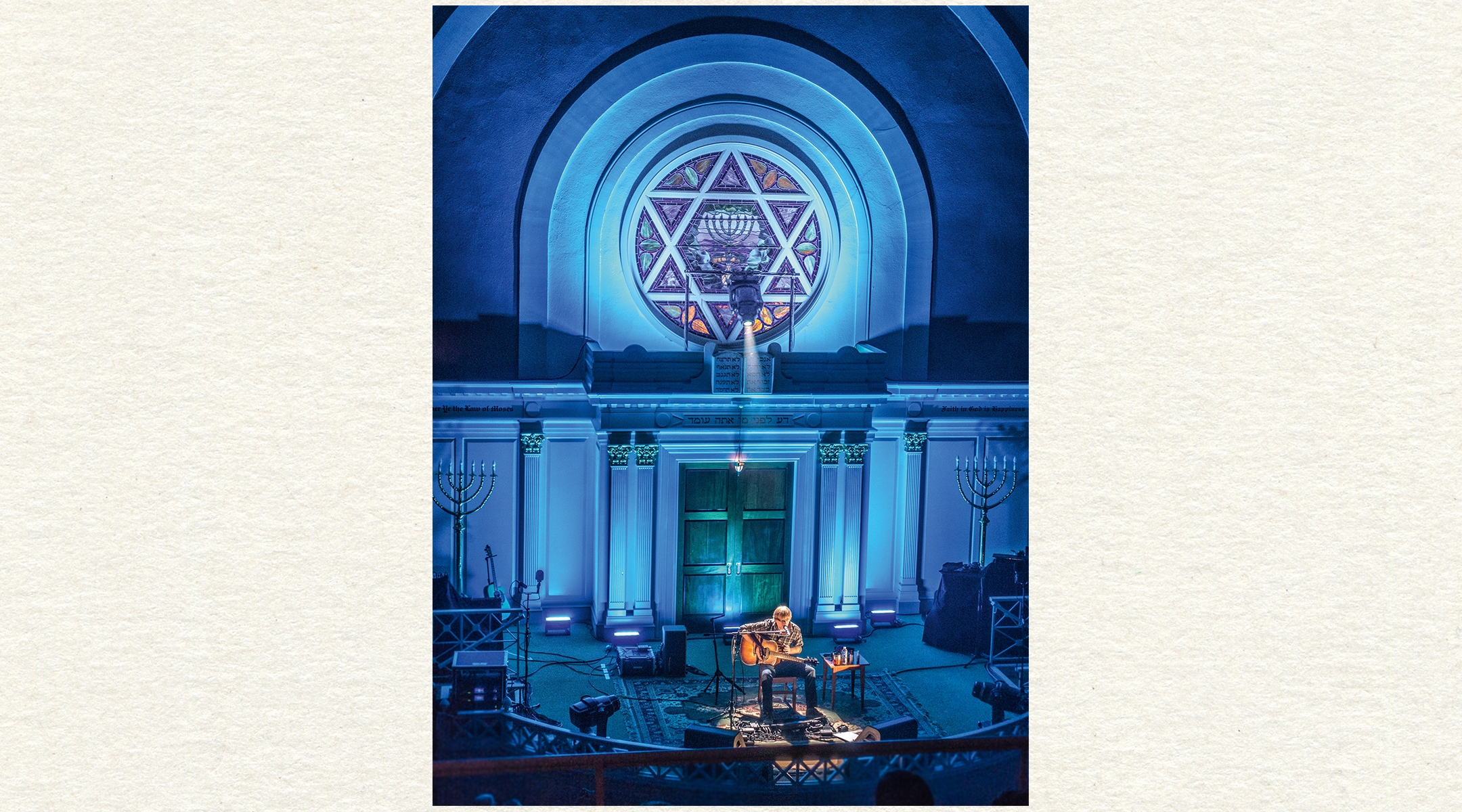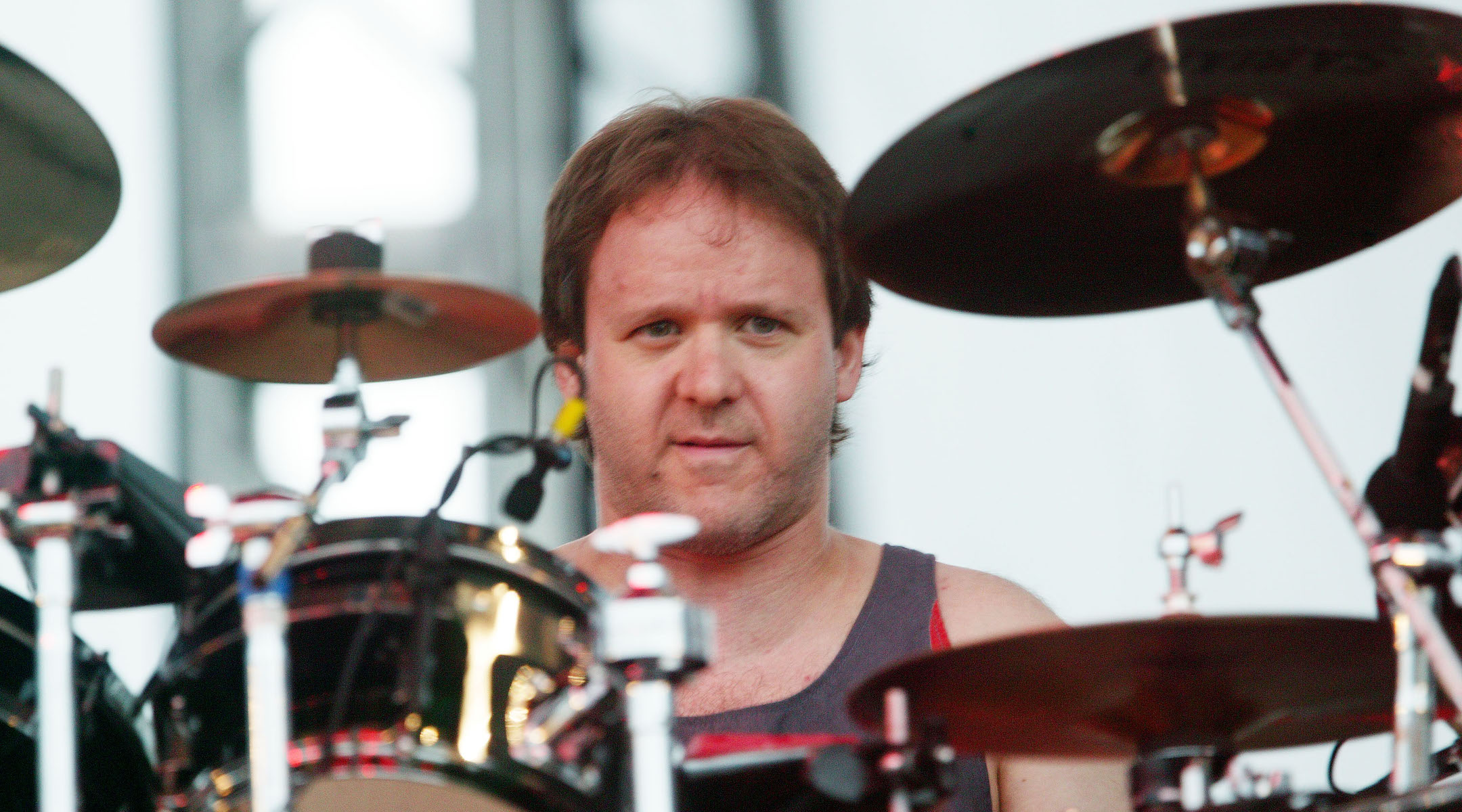What’s Jewish about the jam band Phish? Many things, according to a new book.
‘This Is Your Song Too: Phish and Contemporary Jewish Identity’ explores the the relationship between the band and Jewish fans through a series of essays

Phish, shown performing in 2004, have cultivated a following that tracks them with religious fervor. (Jeff Kravitz/FilmMagic)
(JTA) — Those who are Jewish, or Phish fans — or both — have likely noticed at one point: Jews really seem to love Phish.
There are many possible reasons for this, starting with the fact that the genre-bending jam band has many ardent fans of all stripes, having sold millions of albums and played to enormous festival crowds for decades. Two of the band members — bassist Mike Gordon and drummer Jon Fishman — are also Jewish, and the group has been known to play Jewish songs such as “Yerushalayim Shel Zahav” and “Avinu Malkeinu” live.
But there’s something else — a certain kind of spiritual aspect to Phish fandom that seems to attract the average modern Jewish fan.
“Phish is one of many vehicles through which Jewish fans connect on a meaningful level with their cultural Jewish identity,” University of San Francisco Professor Oren Kroll-Zeldin told the Jewish Telegraphic Agency in 2019. “Phish provides an alternative venue to build Jewish community and Phish shows become a site where fans can have meaningful Jewish experiences outside the confines of traditional Jewish life.”
A new book titled “This Is Your Song Too: Phish and Contemporary Jewish Identity,” published this week by Penn State University Press, explores the ins and outs of the relationship through essays from several Phish fans and an interview with Gordon. It’s edited by Kroll-Zeldin and Ariella Werden-Greenfield of Temple University, who in 2019 hosted a conference — likely the first of its kind in academia — on the topic.
“There are so many connections and synergies between Jewish identity and Phish fandom,” Werden-Greenfield told JTA. “What we really have tried to highlight in this book… is the answer is different for every Phish fan who identifies Jewishly in and around Phish.”
As Phish’s legend grew in the 1990s, many Jews learned about them at Jewish summer camps, Kroll-Zeldin said. “Time and time again, people said ‘I learned about Phish from my camp counselor, and then I passed the music down to my campers, who then passed the music down to other campers,” in a process he compared to the Jewish tradition of passing the Torah down through the generations.
Since Phish is also known for their extensive live shows, Phish fans also love to intensely analyze setlists (along with their lyrics, musical styles and more).
“It’s’ very similar to how Jews engage with textual exegesis of Torah and Talmud,” Kroll-Zeldin added.
Another big part of the connection is a healthy sense of humor found in Phish’s lyrical themes and stage presence.
“They are playful and curious and experimental, and that is something that resonates with a lot of Jewish listeners,” Werden-Greenfield said of Phish.

Kroll-Zeldin and Werden-Greenfield were friends and college classmates at Skidmore College — where Phish played an early show in 1990. In the years afterward, they would see each other at Phish shows and then, once they both pursued careers as religious studies academics, at conferences. Both said they have lost track of how many Phish shows they have personally attended.
Their 2019 conference led to a call for papers, some of which ended up in the book.
While many Jewish Phish fans are secular, the book includes essays from devotees of the band who are more observant and often must reconcile the timing of shows with that of Shabbat. Religious services have been held during set breaks at Phish shows, with kosher food sometimes sold in the “shakedown” area, outside of concerts.
There’s also a chapter about Phish and food. The Jewish ice cream purveyors Ben and Jerry — natives of Vermont, where Phish formed — have been offering their Phish Food flavor for years, while Federal Donuts, owned by Philadelphia-based Israeli-American chef Michael Solomonov, has created out multiple special editions of Phish-themed donuts.
In addition to the essays, the book features numerous photographs, of everything from parking lot prayers to Phish-themed dreidels, bat mitzvah invitations and wedding ketubahs.
The band has always seemed to happily nod to its large Jewish fan base. The band got its start playing in cities, towns and colleges in areas with large Jewish populations, and the majority of their performances are still close to metro areas with large Jewish populations. Frontman Trey Anastasio played a solo show at the Sixth and I Synagogue in Washington, D.C., in 2018.
A big part of the book, mentioned by several essayists, is Phish’s performance of “Avinu Malkeinu.” Phish does not play the song often — once every 23.9 shows, according to phish.net‘s exhaustive database — but the band has played it a total of 83 times over many years, between 1987 and 2022.
Why “Avinu Malkeinu”? The book shares the heretofore untold story of how Phish’s Gordon, while growing up in suburban Boston, first heard the song from Rabbi Lawrence Kushner, a prominent rabbi and author in the Reform movement, who happened to be Gordon’s childhood rabbi. Kushner would sing the melody, sometimes wordlessly, “for everything,” including during Havdalah services. While, per the book, Gordon “admits that he never fully accepted Judaism’s belief system or rituals or and even rebelled against them,” that song stuck with him.

“[Aveinu Malkeinu] was getting not just into my ears but into my soul,” Gordon says in the book. “And so, when I’m bringing that song to the table [with Phish], in some ways… I’m referring back to an experience that was a deep soul experience for me, using that melody.”
The Phish bassist has a sister-in-law who is a cantor, and at the time of the interview, he was planning to sing with his daughter as part of a Zoom-based “Havdalah coffee shop.”
“Looking out into the crowd, it was easy to see who the Jews were because their eyes would light up when we went into it, and that was kind of fun,” Gordon said in the book of the band’s earliest performances of “Avinu Malkeinu.” “When we were playing in clubs and theaters and Jewish people wandering in having no idea that they were going to hear anything in Hebrew, there it was. A look of shock. I liked that part of it.”
For all of its Jewish connections, one thing Phish has not ever done is perform in Israel. There’s been a great deal of campaigning over the years for such a visit by Phish fans who live there, including one woman named Rachel Loonin Steinerman, interviewed in the book, who created the “OhKeePah,” a kippah made from the same fabric as the signature muumuu sported by drummer Fishman during shows. She inscribed #PhishInIsrael on the inside of each.
Music journalist Shirley Halperin says in the book that she spent time in Israel with drummer Fishman in 1993 — including an early-morning hike to the top of Masada — and that Gordon had reached out to her when he was trying to learn how to sing “Yerushalayim Shel Zahav.”
“What is it about Phish and Jews? I don’t know, but a lot of Jews are doing Jewish stuff at Phish shows, which makes it a very joyful way to be Jewish,” Kroll-Zeldin said.
This article originally appeared on JTA.org.
















